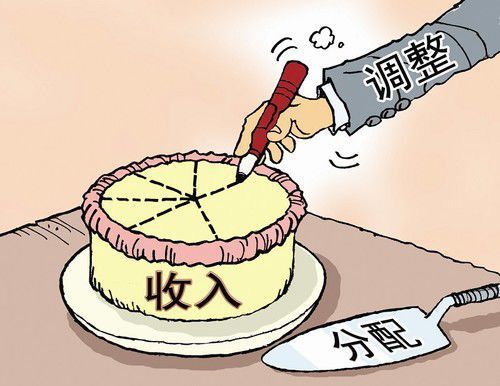Article/Jia Kang of China Economic 50 People Forum
We should go deeper into the internal structure of residents' income in China's income distribution. We need to further explore whether the income distribution gap among our residents is too large, the rules are disordered, and the injustice is seriously affecting China's modernization process. This is the key to the problem.
 What is the real problem of income distribution?
What is the real problem of income distribution? Chinese society has entered the "middle-income stage", and among the contradictions that follow, the distribution of residents' income is a hot spot. There are different opinions. The general feeling is that there is dissatisfaction, but what is the specific problem? It seems that everyone's understanding is not clear enough.
In the face of various unsatisfactory aspects of the income distribution pattern, there are two views that can be called mainstream and highly recognized. One is that the government and enterprises in the income distribution pattern are obviously on the high side. In other words, the share of residents' income is on the low side. This recognition has been emphasized many times over the years, and specific data are also available. For example, the share of residents' income has declined by about 10 percentage points in more than ten years, and the consumption rate is very low.
Of course, this understanding is also linked with the dissatisfaction of social members after they enter the middle-income stage. Therefore, many people have proposed that while expanding domestic demand, efforts should be made to increase the proportion of residents' income, so that consumption will become the main trend in the future Power source In other words, in the future, there will be a shift from investment driven to consumption driven, but the basis for the basic quantification of this view is almost invisible in the discussion.
Another understanding was put forward by some scholars after their own argumentation and several rounds of calculation. They believed that China's income distribution was characterized by huge gray and black incomes. Although the official statistics did not provide data, these gray and black incomes were held by some members of the society. According to the latest round of calculation results of the scholar, there are actually more than 60000 billion yuan of gray and black income in China's entire GDP.
This leads to a judgment: if the implicit income of about 6 trillion yuan is recognized, the mainstream understanding mentioned earlier will not be established. Because China's GDP is now five or six trillion yuan, if more than ten points of it are actually personal income that is not counted, then the share of residents' income that is accused of being low will be added to ten points, and become at least 50%.
So we have to ask, which one is right, because both of them have mainstream characteristics and are widely recognized by people? The author has not yet seen any official response from any scholar in this regard. I don't think we can quickly reach a consensus in this regard, but two contradictory understandings, like ice and fire, have been widely recognized in the society at the same time, which is worth our thinking.
So, what's the real problem? The author does not think that there is a researcher who can clearly explain the value of the income pattern mentioned above: what is the value of the income share and the real investment rate and consumption rate of the Chinese government, enterprises and residents.
We should go deeper into the internal structure of residents' income in China's income distribution, that is, under the condition of looking at the overall income distribution, in addition to the proportion of government, enterprises and residents and the consideration of investment and consumption, we need to further explore, Whether the income distribution gap among our residents is too large, the rules are disordered, and the problem is unfair, which is seriously affecting China's modernization process. The author believes that this is the key to the problem, or the real problem that researchers should pay more attention to.
The income gap is large, which has been proved by the statistical calculation results of the Gini coefficient (the official data is 0.49 in 2009 and 0.469 in 2014, which is still significantly high). More importantly, this income gap, while interacting with property allocation, to a large extent, includes various unfair mechanisms, unreasonable rules, and inadequate systems.
Therefore, effectively promoting the institutional anti-corruption and building a clean government and focusing on the construction of redistribution system and mechanism (such as gradually increasing the proportion of direct taxes and reasonably constructing the income distribution rules and order) have become the historical test that we must undergo in building a modern country.
(originally published in the Chinese Times)
(The author of this article introduces: Director of the Institute of Financial Science, Ministry of Finance, researcher, doctoral supervisor.)

